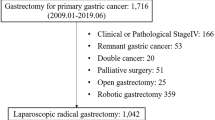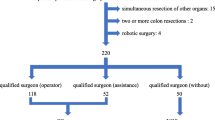Abstract
Purpose
The Endoscopic Surgical Skill Quantification System for qualified surgeons (QSs) was introduced in Japan to improve surgical outcomes. This study reviewed the surgical outcomes after initial experience performing laparoscopic distal gastrectomy (LDG) and evaluated the improvement in surgical outcomes following accreditation as a QS.
Methods
Eighty-seven consecutive patients who underwent LDG for gastric cancer by a single surgeon were enrolled in this study. The cumulative sum method was used to analyze the learning curve for LDG. The surgical outcomes were evaluated according to the two phases of the learning curve (learning period vs. mastery period) and accreditation (non-QS period vs. QS period).
Results
The learning period for LDG was 48 cases. Accreditation was approved at the 67th case. The operation time and estimated blood loss were significantly reduced in the QS period compared to the non-QS period (230 vs. 270 min, p < 0.001; 20.5 vs. 59.8 ml, p = 0.024, respectively). Furthermore, the major complication rate was significantly lower in the QS period than in the non-QS period (0 vs. 10.6%, p = 0.044).
Conclusions
Experience performing approximately 50 cases is required to reach proficiency in LDG. After receiving accreditation as a QS, the surgical outcomes, including the complication rate, were improved.

Similar content being viewed by others
References
Kitano S, Iso Y, Moriyama M, Sugimachi K. Laparoscopy-assisted Billroth I gastrectomy. Surg Laparosc Endosc. 1994;4:146–8.
Katai H, Mizusawa J, Katayama H, Takagi M, Yoshikawa T, Fukagawa T, et al. Short-term surgical outcomes from a phase III study of laparoscopy-assisted vs. open distal gastrectomy with nodal dissection for clinical stage IA/IB gastric cancer: Japan Clinical Oncology Group Study JCOG0912. Gastric Cancer. 2017;20:699–708.
Kim W, Kim HH, Han SU, Kim MC, Hyung WJ, Ryu SW, et al. Decreased morbidity of laparoscopic distal gastrectomy compared with open distal gastrectomy for stage I gastric cancer: short-term outcomes from a multicenter randomized controlled trial (KLASS-01). Ann Surg. 2016;263:28–35.
Kimura T, Mori T, Konishi F, Kitajima M. Endoscopic surgical skill qualification system in Japan: five years of experience in the gastrointestinal field. Asian J Endosc Surg. 2010;3:66–70.
Tanigawa N, Lee SW, Kimura T, Mori T, Uyama I, Nomura E, et al. The endoscopic surgical skill qualification system for gastric surgery in Japan. Asian J Endosc Surg. 2011;4:112–5.
Ichikawa N, Hommma S, Funakoshi T, Ohshima T, Hirose K, Yamada K, et al. Impact of technically qualified surgeons on laparoscopic colorectal resection outcomes: results of a propensity score-matching analysis. BJS Open. 2020. https://doi.org/10.1002/bjs5.50263.
Aoyama S, Inoue Y, Ohki T, Itabashi M, Yamamoto M. Usefulness of the endoscopic surgical skill qualification system in laparoscopic colorectal surgery: short-term outcomes: a single-center and retrospective analysis. BMC Surg. 2019;19:90. https://doi.org/10.1186/s12893-019-0528-2.
Yamada T, Kumazu Y, Nakazono M, Hara K, Nagasawa S, Shimoda Y. Feasibility and safety of laparoscopy-assisted distal gastrectomy performed by trainees supervised by an experienced qualified surgeon. Surg Endosc. 2020;34:429–35.
Oki E, Tsuda Y, Saeki H, Ando K, Imamura Y, Nakashima Y. Book-binding technique for Billroth I anastomosis during totally laparoscopic distal gastrectomy. J Am Coll Surg. 2014;219:e69-73.
Japanese Gastric Cancer Association. Japanese gastric cancer treatment guidelines 2014 (ver.4). Gastric Cancer. 2017;20:1–19. https://doi.org/10.1007/s10120-016-0622-4.
Dindo D, Demartines N, Clavien PA. Classification of surgical complications: a new proposal with evaluation in a cohort of 6336 patients and results of survey. Ann Surg. 2004;240:205–13.
Page ES. Continuous inspection schemes. Biometrika. 1954;41:100–15.
Katai H, Mizusawa J, Katayama H, Morita S, Yamada T, Bando E, et al. Survival outcomes after laparoscopy-assisted distal gastrectomy vs. open distal gastrectomy with nodal dissection for clinical stage IA or IB gastric cancer (JCOG0912): a multicentre, non-inferiority, phase 3 randomised controlled trial. Lancet Gastroenterol Hepatol. 2020;5:142–51.
Kim HH, Han SU, Kim MC, Kim W, Lee HJ, Ryu SW, Korean Laparoendoscopic Gastrointestinal Surgery Study (KLASS) Group, et al. Effect of laparoscopic distal gastrectomy vs. open distal gastrectomy on long-term survival among patients with stage I gastric cancer: the KLASS-01 randomized clinical trial. JAMA Oncol. 2019;5:7506–13.
Yoshida K, Honda M, Kumamaru H, Kodera Y, Kakeji Y, Hiki N, et al. Surgical outcomes of laparoscopic distal gastrectomy compared to open distal gastrectomy: a retrospective cohort study based on a nationwide registry database in Japan. Ann Gastroenterol Surg. 2017;22:55–64.
Wang B, Son SY, Shin HJ, Hur H, Han SU, et al. The learning curve of linear-shaped gastroduodenostomy associated with totally laparoscopic distal gastrectomy. J Gastrointest Surg. 2019. https://doi.org/10.1007/s11605-019-04329-3.
Jin SH, Kim DY, Kim H, Jeong IH, Kim MW, Cho YK, et al. Multidimensional learning curve in laparoscopy-assisted gastrectomy for early gastric cancer. Surg Endosc. 2017;21:28–33.
Tokunaga M, Hiki N, Fukunaga T, Miki A, Nunobe S, Ohyama S, et al. Quality control and educational value of laparoscopy-assisted gastrectomy in a high-volume center. Surg Endosc. 2009;23:289–95.
Nunobe S, Hiki N, Tanimura S, Nohara K, Sano T, Yamaguchi T, et al. The clinical safety of performing laparoscopic gastrectomy for gastric cancer by trainees after sufficient experience in assisting. World J Surg. 2013;37:424–9.
Kuroda S, Kikuchi S, Hori N, Sakamoto S, Kagawa T, Watanabe M, et al. Training system for laparoscopy-assisted distal gastrectomy. Surg Today. 2017;47(7):802–9. https://doi.org/10.1007/s00595-016-1439-9.
Kaito A, Kinoshita T. Educational system of laparoscopic gastrectomy for trainee-how to teach, how to learn. J Vis Surg. 2017;13(3):16. https://doi.org/10.21037/jovs.2016.12.13.
Kim MG, Kim KC, Yook JH, Kim BS, Kim TH, Kim BS. A practical way to overcome the learning period of laparoscopic gastrectomy for gastric cancer. Surg Endosc. 2011;25:3838–44.
Kunisaki C, Makino H, Yamamoto N, Sato T, Oshima T, Nagano Y, et al. Learning curve for laparoscopy-assisted distal gastrectomy with regional lymph node dissection for early gastric cancer. Surg Laparosc Endosc Percutan Tech. 2008;18:236–41.
Zhang X, Tanigawa N. Learning curve of laparoscopic surgery for gastric cancer, a laparoscopic distal gastrectomybased analysis. Surg Endosc. 2009;23:1259–64.
Jeong O, Jung MR, Park YK, Ryu SY. Safety and feasibility during the initial learning process of intracorporeal Billroth I (delta-shaped) anastomosis for laparoscopic distal gastrectomy. Surg Endosc. 2015;29:1522–9.
Amin MB, Greene FL, Edge SB, Compton CC, Gershenwald JE, Brookland RK, et al. The eighth edition AJCC cancer staging manual: Continuing to build a bridge from a population-based to a more “personalized” approach to cancer staging. CA Cancer J Clin. 2017;67:93–9. https://doi.org/10.3322/caac.21388.
Acknowledgements
This work was supported by JSPS Early Career Scientists, Grant number 18K16362.
Funding
None.
Author information
Authors and Affiliations
Corresponding author
Ethics declarations
Conflict of interest
The authors declare that they have no conflicts of interest for this study.
Ethical statement
The study was approved by the Institutional Review Board of Okayama University Hospital (No. 2101-021) and Shikoku Cancer Center (Rin2020-92). The research reported in this paper was in compliance with the Declaration of Helsinki.
Additional information
Publisher's Note
Springer Nature remains neutral with regard to jurisdictional claims in published maps and institutional affiliations.
Supplementary Information
Below is the link to the electronic supplementary material.
Rights and permissions
About this article
Cite this article
Kikuchi, S., Kagawa, T., Kuroda, S. et al. Accreditation as a qualified surgeon improves surgical outcomes in laparoscopic distal gastrectomy. Surg Today 51, 1978–1984 (2021). https://doi.org/10.1007/s00595-021-02309-2
Received:
Accepted:
Published:
Issue Date:
DOI: https://doi.org/10.1007/s00595-021-02309-2




